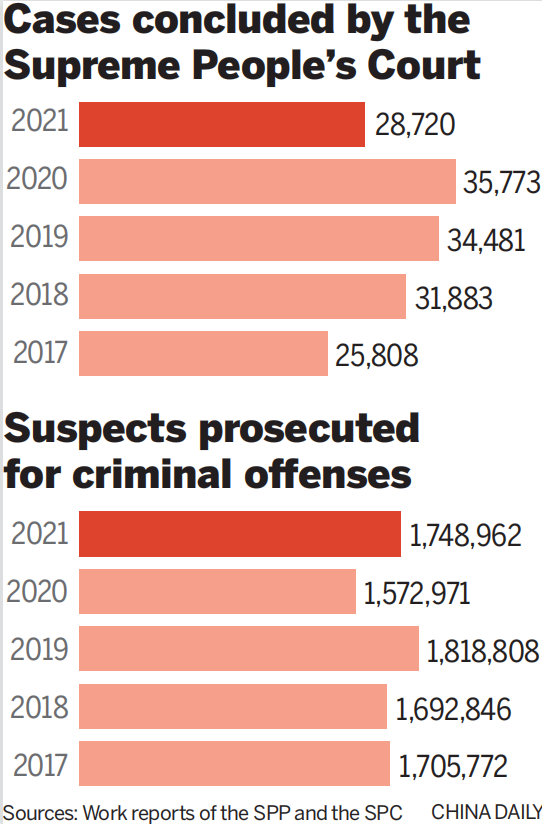Nation's personal information protection efforts bear fruit

China's efforts to better protect people's personal information resulted in a rapid rise in the number of lawsuits last year, according to the work reports of the country's top judicial authorities unveiled on Tuesday.
Prosecutors nationwide charged 3,436 people with harming people's personality rights-breaches against people's right to privacy or reputations-for example through online defamation or misuse of people's personal information. The figure represented a 51.3 percent year-on-year increase, according to the Supreme People's Procuratorate work report.
The report was submitted to the ongoing fifth session of the 13th National People's Congress, China's top legislature, for review on Tuesday.
A typical case mentioned in the report happened in Guangdong province, and involved a man surnamed Wu who was arrested in connection with an online libel case in late December. Police said Wu downloaded a photo of a woman and her grandfather from the internet, uploaded it and falsely said they were husband and wife, which seriously harmed the woman's reputation.
"The internet space is virtual, but the rule of law must be concrete," Procurator-General Zhang Jun said while delivering the report to national lawmakers.
As prosecutors have stepped up efforts to deal with personality rights offenses, the courts have also focused more on related lawsuits.
Last year, courts nationwide concluded 4,098 cases related to infringing on personal information, in which people's identity cards, contact details, express delivery messages, WeChat accounts and patient data were stolen or purchased, a 60.2 percent year-on-year increase, according to the work report of the Supreme People's Court.
Given that protection of personal information has become an urgent issue in this information era, "we've harshly combated crimes of stealing or purchasing personal data through the use of malicious programs or phishing software", Zhou Qiang, president of the SPC, said while making the report to the NPC on Tuesday.
"Those who infringed upon personal information, instigated online bullying and defamed others in cyberspace were also held criminally liable," he said.
In one case highlighted by the top court, a person surnamed Li was convicted of infringing upon other's personal information by making and using software that could steal people's photos if they downloaded and installed the software.
To help prevent misuse of facial recognition systems, a major feature of artificial intelligence applied in many areas, the SPC also issued a judicial interpretation last year, clarifying boundaries for the use of such technology.
The rising number of cases handled by prosecutors and judges reflects the legal strength of China's Civil Code-a fundamental and comprehensive code that highlights the protection of personality rights and took effect on Jan 1, 2021-and the Personal Information Protection Law that took effect on Nov 1, 2021, according to He Xiaorong, vice-president of the SPC.
"The two laws are our legal basis for protecting personal information and guaranteeing people's dignity," he said.
Photos
Related Stories
Copyright © 2022 People's Daily Online. All Rights Reserved.










